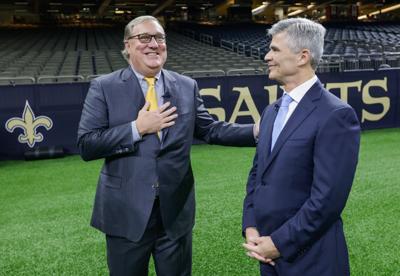First, the good news.
The New Orleans Saints and state officials are close to an agreement on a long-term deal that will keep the team in Louisiana for the foreseeable future.
The agreement would extend the team’s lease at the Caesars Superdome through 2035 and include multiple five-year options that could bind the team to Louisiana for two decades beyond that.
Team and state officials have made significant progress in recent talks since a highly publicized impasse earlier this summer. The hope and expectation are that a new deal will be reached before or during the 2024 season.
The devil, of course, will be in the details. And those, for now, have been kept private.
Unlike our peers in Jacksonville and Kansas City, we allow our appointed elected officials to handle these high-stakes lease negotiations in private. The duty falls on the Superdome Commission, led by attorney Robert Vosbein Jr., who was appointed by Gov. Jeff Landry as chairman on the group, and Doug Thornton and Evan Holmes of ASM Global, the managers of the Superdome.
Long-term stadium lease negotiations are always complicated. This one is more critical than others, because it likely will extend beyond the tenures of the involved parties.
Saints owner Gayle Benson turns 78 in January and, by all accounts, is in great health. But it’s almost certain that she will have to sell the team before this new deal expires. Consequently, it’s paramount that Vosbein, Thornton, et al., do everything possible to protect the state’s long-term interests.
That means an ironclad non-relocation agreement and steep buyout terms to ensure the next owner keeps the Saints in New Orleans.
Above all, keeping the Saints in New Orleans has to be the top priority. The team is too valuable to the city and state to leave any wiggle room.
While Benson and Saints officials steadfastly have pledged their allegiance to New Orleans and the Gulf Coast region, this lease negotiation really isn’t about them. It’s about the next owner, whomever that will be.
While New Orleans is an excellent NFL market with a passionate fan base that any sensible owner would be reluctant to abandon, the reality is it’s still smaller and poorer than most of its NFL peers. And its stadium is already one of the oldest in the league. The Dome will be downright ancient by the time new ownership takes over the Saints.
One thing New Orleans has going for it is geography. It sits in the heart of the Gulf Coast, aka SEC West country, which annually ranks among the national leaders in football interest, readership and TV ratings. Remove New Orleans from the NFL map, there’d be no league presence from east Texas to Atlanta, the most football-crazy part of the country.
Of course, passionate fandom goes only so far.
As one high-level sports executive familiar with these types of negotiations likes to say, “The answer to your question is money. And I don’t need to know what your question is.”
Fans in Oakland, San Diego and St. Louis certainly can attest.
As such, it’s incumbent for state officials to strike a deal that maintains the best interests of state taxpayers.
Recent stadium deals in Buffalo, Jacksonville and Tennessee provide a useful blueprint.
The deals for the Bills and Titans have provisions binding them to play at their respective stadiums for the entirety of their 30-year leases and preventing them from even talking to other cities about relocating for the first 25 years of the lease.
They also have steep buyouts in case either team does relocate. Jacksonville would get back all $775 million of its new stadium investment if the Jaguars were to move away during the first 15 years of their lease. In Buffalo, its $850 million. In each case, the amounts decrease by 6.25% annually after the initial 15 years of the deals.
The draft agreements also stipulate that if the Bills or Jaguars seek to leave before their leases expire, their respective cities can go to court for an injunction forcing the team to stay.
Louisiana needs similar protections in its deal with the Saints.
Ultimately, state officials can’t guarantee a new owner won’t move the Saints. After all, Rams owner Stan Kroenke paid $790 million to leave St. Louis. And Raiders owner Mark Davis paid $378 million to leave Oakland.
But they can de-incentivize them by making it extremely difficult and expensive to do so.
A long-term deal is a win for the Saints and the Landry administration. Landry adds another feather to his cap in Year 1 of his term, and the Saints secure their long-term future.
But the only way fans and taxpayers win is if the deal includes ironclad protection against future relocation.
Anything less is a dealbreaker.

